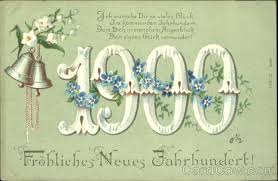--Source: The Lawrenceburg Press
Thursday, January 4, 1900 edition
"Record Breaking Floods Promised For 1900.
W.W. Marsh, the Winton Place weather prophet, predicts that the precipitation in 1900 will be the heaviest on record, and will cause disastrous floods throughout Ohio, Indiana, Kentucky, and West Virginia. Februrary and March will ???? worst floods. January will be the worst storm month. An early spring, he says, will be followed by a hot, sultry summer."
"Miami Fire company held its watch meeting as usual New Year's eve, but owing to the old year going out on Sunday night the festivities were rather quiet. Only members of the company and Goetze's band were present."
"John Ringloff entertained a number of friends with a euchre party at his home on Shipping street New Year's eve."
"The dance given at Oester's hall Monday night was largely attended. Miss Sophia Ringer was awarded first prize as the finest dressed lady and George Fox as the finest dressed gent."--Source: The Lawrenceburg Press
Thursday, January 3, 1901 edition
"Miami Fire company entertained about 200 guests at its watch meeting in Liedertafel opera house Monday night. The supper was unusually appetizing and satisfying. The gardeners 100 years hence will not furnish any choicer celery than the famous article produced by Peter Endress. Joy reigned supreme, and the hour of midnight came all too soon for the happy, light hearted guests."--Source: The Recorder, Rising Sun
Friday, January 4, 1901 edition
"To mark the birth of the new century in France, the last day of the year was proclaimed a general holiday."
Written by C.E.K.
Source: Rising Sun Recorder
Friday, December 28, 1900 edition
Like the North Star of the universe, like the Alpha and the Omega, is the dawn of New Year's Day a realm of reckoning and esteem for the past and a glance into the future. With a business-like regularity the day records on the pages of history the close of a decade and the beginning of a new year of promise and hope. Good intentions, which oftimes mark the appearance of a new year, are as a whole well meaning and made in good faith, yet occasionally blighted by obstacle and failure. It sets anew the sails of man and enables him to oil up his conscience for another twelve month period. Upon the yearly occasion at this time is assigned a double duty in view of entering into a new century. The looking back on the past hundred years of history and progress gives new life and vigor to one's soul to begin the events of the new epoch.
It is a day of reminiscence, on which the most romantic and ancient of incidents are appropriately brought to mind; a time on which the oldest citizens are often called upon to narrate the many events and adventures of their vast experience of the world; when the bibulously inclined make new resolves; when youth and society pay tribute to the dawn of the new year by social calls and happy wishes of success and prosperity.
New Year's Day by custom, brings to mind a day of commemoration, and the idea of its celebration, which as a holiday is possibly as old as civilization itself. The custom of celebrating by some religious observance, generally accompanied by festive rejoicing, the first day of the year, appears to have prevailed among most of the ancient nations. Though time has not recorded the date of its first observance, it is known that the early Jews, Romans, Chinese, and even the Egyptians and Mohamedans, although differing as to the time from which they reckoned the commencement of the year, all regarded it with special interest. It has always been a day of merriment, from primitive times to the present.
In Rome, the year anciently began in March. The great diversity of opinion among the Christians made the day of entering upon the new year difficult to establish, owing to the communication between the leaders of the church being impracticable, and to the inability to secure unanimity as to a definite date. Both as to time and manner of celebrating, considerable variety prevailed.
Christmas day, the Annunciation, (March 25) Easter Day, and March 1st, have all at different times or places shared with the first of January the honor of opening the New Year or Century; nor was it until the advanced years of the sixteenth century that the latter date was universally accepted as the first day of the calendar year. It has, and possibly always will be a day of eminence, and a national holiday of merry-making and sport, although the fathers of the church, including Chrysostom, Ambrose, Augustine, Peter Chrysologus, and others, tried vainly to establish it a day of fasting and prayer. The Christians forbid the pagan festival and insisted that it be a day of humiliation. The mandate, however, was but partially observed. The festal character of the day, generally speaking, has been still preserved, though the day is also observed as a day of prayer and thanksgiving. The latter observances have more or less been properly attached to it in view of the fact that the first of January is known as the eighth day after the nativity of our Saviour, the commemoration of His spiritual purification of circumcision.
In substance, the observance of New Year's Day, both socially and religiously, appears to have remained the same from early ages. It is impossible to attach to it a purely religious practice, in view of its character. The idea and thought of bidding adieu to the old and clasping in warm hands and hearts of welcome the new, naturally invites a revelry and flow of good "spirits" and jollification.
Social feasting seems to have been universal, and the interchange of presents, to, from the earliest recorded celebrations. In the early writings of Suetonius and Tactitus references are frequently made of their practice of bringing of New Year's gifts. The custom of mutual reciprocation in this manner has been continued among the Christian kingdoms since the downfall of the western empire and the rise of the modern nations, and is today of equal popularity. Many examples of this practice have been found in the British possessions during the past, and even as a part of the public expenditures of the court, down to the reign of Charles II. In the antiquarian writings of that country we find mention of this custom in all classes of society. It is somewhat eclipsed in popularity by the Christmas gifts, though the practice still subsists; and almost as much, too, in the country of France.
The Church also is very dutiful on this occasion; with merry peal of bells the New Year is welcomed. Watch-night services are popular attractions to the wayfarer of the street, whose acquaintance of the house of God is as limited as his knowledge of the altar of an African idol. In many countries the "eve," more commonly known as "Sylvester's Eve," is given a celebration of great festivity, which is prolonged until the midnight hour, when the new year is ushered in with congratulations, complimentary visits, and mutual good wishes for "A Happy New Year." This custom is more properly credited to the ancient Scotch, though it is also prevalent among the celebrities of Germany, where the form of wish is, "Pro-sit-New-Jahi"--"May the New Year be happy." This sufficiently attests the antiquity and universality of their traditional practices and customs. In many places, more popularly in our own continent, the habit of tolling the bells at midnight, and thus "ring out the old, and ring in the new," is observed, and is received somewhat pathetically.
With the religious sects, which are wont to solemize this day with special services, the Roman Catholics still close the old year with their song, "Te Deum"--and hold the anniversary with the strictest obligations.
This information was
produced and provided courtesy of:
Kathleen Esposito
 Turn Page
Turn Page 
 Turn Page
Turn Page 


